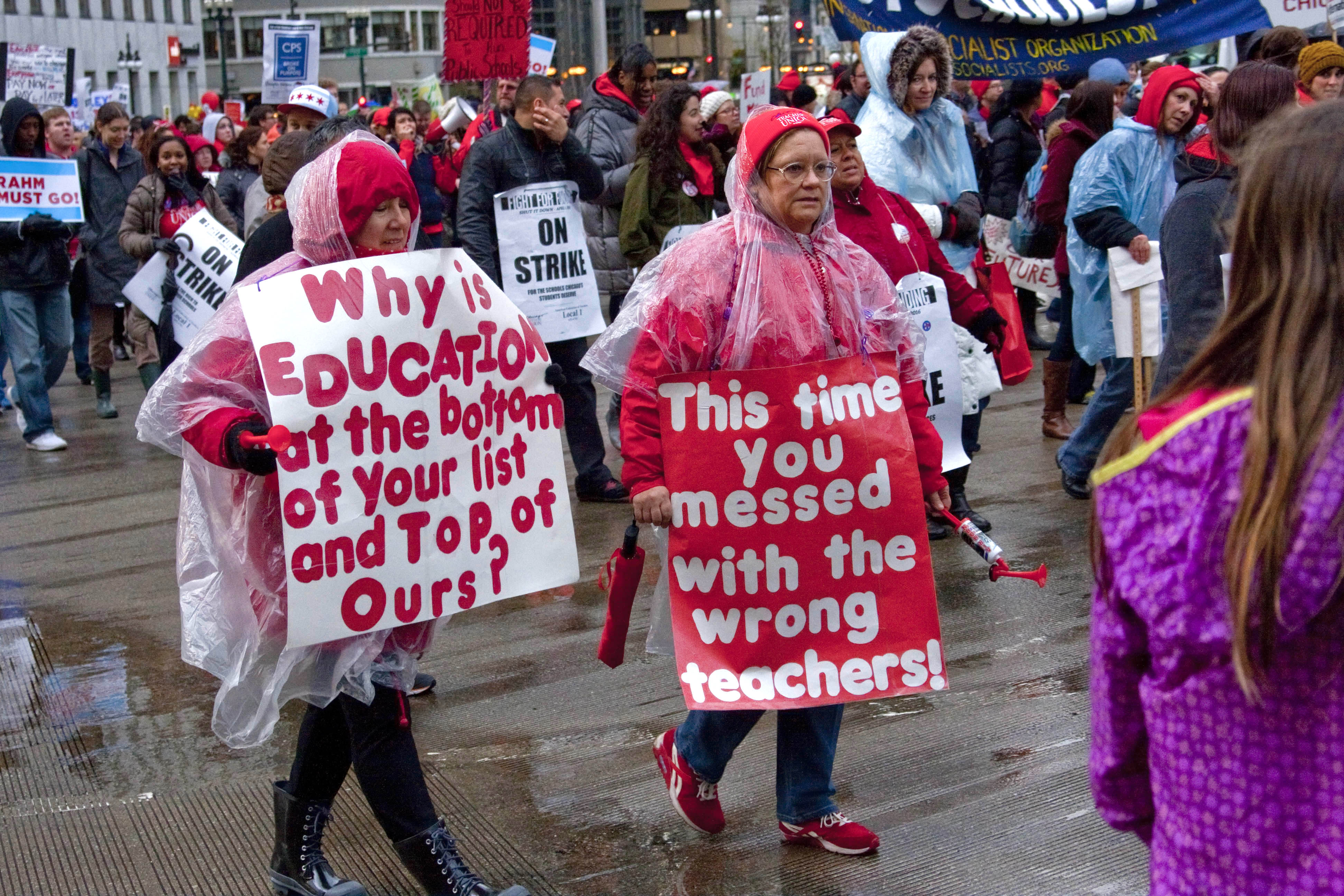With salaries failing to compete with other job fields of similar caliber, teacher's need to unionize in order to protect the profession and the education of our children.
If you were to explore various polls and online debates about teachers' unions and whether or not they help the current situation, you would find varying opinions. You'd be able to find some decent arguments on both sides, and some completely rational people that believe one way or the other, and you would also find hordes of people flocking to one side because of their political alignment or background with no real opinion as to why unions are either good or bad. The clarity of what unions accomplish and what they are good for is hard to find amidst the posts and rants that abound when you search this topic from a public opinion standpoint. Many wholeheartedly condemn them, while many embrace them without a second thought. So are unions really all that great? Do teachers really need them?
When there is a revolution of any sort, there is almost always a period of discomfort, logistical problems, and even moral failings. Take for example the Reformation period. While the motives and actions of those working against the Catholic Church at the time were good and just, were there not casualties of that great revolution? Or for example the American Revolution, surely we can all look back on these events and say that the end did in fact justify the somewhat rash means that were used to get there. This is not to say that I believe that teachers' unions should incite violent rebellions or that I believe that the issue of better pay is completely on par with civil and religious freedom, but I do believe that unions, while sometimes messy, get the job done in the long run.

Image Credits:

Imagine if there were no unions for teachers anywhere in the United States. At first there would be strikes and a lot of transient teachers moving from place to place to find decent pay, but after a while, more and more people entering the workforce and attending college would choose not to pursue teaching as a career. The number of teachers would drop dramatically and the sizes of classrooms would drop leading to more and more students not getting the help that they need. Ultimately, the less teachers we have, the more students that will flunk out of school. After this great educational exodus there would be a famine of qualified educators that would force school districts to hire unqualified educators for significantly less pay, producing significantly lower quality results. It boils down to this simple idea: unions protect the future of teachers, students, and America by preventing a mass migration away from the field of education. Without strikes, perhaps more lessons would be taught, but then also perhaps less people would desire to become a teacher.
I have always wanted to be an educator, ever since I was young, but the poor working conditions have dampened my spirits as of late regarding entering the field. Some of my family members, including my father in law, are in or have been in the teaching field. Their experiences and salaries vary so heavily based on what state they teach in, and whether or not that state has legitimate teachers unions. For example, I have one relative who teaches in Washington, a state with unions that negotiate better salaries and help with job security. Another one of my relatives works here in Utah where the union is not allowed to bargain for wages and is not able to provide contracted job security. He recently shared with me that he could be fired at any time, and that being fired during the school year is very difficult to bounce back from, as openings are few and far between. These discrepancies will cause serious problems that go far beyond short strikes.
I have always wanted to be an educator, ever since I was young, but the poor working conditions have dampened my spirits as of late regarding entering the field. Some of my family members, including my father in law, are in or have been in the teaching field. Their experiences and salaries vary so heavily based on what state they teach in, and whether or not that state has legitimate teachers unions. For example, I have one relative who teaches in Washington, a state with unions that negotiate better salaries and help with job security. Another one of my relatives works here in Utah where the union is not allowed to bargain for wages and is not able to provide contracted job security. He recently shared with me that he could be fired at any time, and that being fired during the school year is very difficult to bounce back from, as openings are few and far between. These discrepancies will cause serious problems that go far beyond short strikes.
With a workforce that is so important to the future of our country and our youth, the necessity of unions for teachers across the board is more than apparent, it is obvious to anyone who values education and the wealth it brings to our country and our lives.
Sources:
- “Should Teachers Be Allowed to Strike?” Debate.org, www.debate.org/opinions/should-teachers-be-allowed-to-strike.
- Lombardo, Crystal. “13 Pros and Cons of Teachers Unions.” Vittana.org, 1 Aug. 2017, vittana.org/13-pros-and-cons-of-teachers-unions.
- Mader, Jackie. “The Rise of Teacher Unions: A Look at Union Impact over the Years.” HechingerEd, 19 Sept. 2012, hechingered.org/content/the-rise-of-teacher-unions-a-look-at-union-impact-over-the-years_5601/.
- Munn, Kelly. “Strikes FAQ – League of Education Voters Foundation.” League of Education Voters, 2018, educationvoters.org/resources/strikes/.
Image Credits:
- "students-in-class-with-teacher-reading" by Ilmicrofono Oggiono is licensed under Creative Commons.
- "Chicago Teachers Union Day of Action Strike" by Charles Edward Miller is licensed under Public Domain.


People being against strikes is similar to governments being against revolutions. Of course people want to be given the service they expect, and of course governments in power don't want to be overthrown or changed. But in both cases, change itself is the key issue. People strike for change, people revolt for change. And I would argue that when people care about change enough to strike or revolt, it's probably a change worth considering.
ReplyDelete